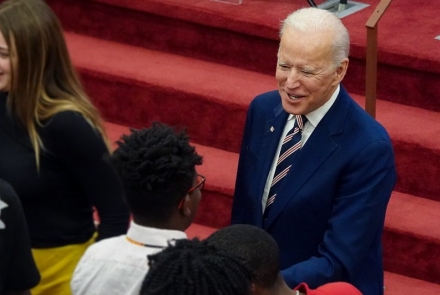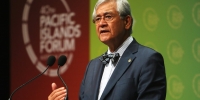
Photo by stingrayschuller on Flickr
Implications of the Biden presidency for the Pacific Island region
The Biden presidency brings new opportunities and challenges for the region, Jay Caldwell writes.
In 2021, the Pacific is not getting any less crowded or complex. Pacific leaders will be required to adapt to a shifting global agenda, with the Biden-Harris administration the newest factor to consider. President Biden’s policy priorities appear to be a stark shift away from President Trump’s ‘America first’ mantra, delivering Pacific countries more upside than risk.
The big takeaway for the Pacific is that Biden will seek to reinvigorate multilateralism. This is generating considerable optimism as Pacific countries are adept at using global forums to advocate for their shared interests – particularly climate change. Trump’s dismissal and undermining of multilateral fora was a point of some frustration for Pacific Island states.
Conversely, the Biden-Harris administration’s commitment to international agreements and organisations, including the World Health Organization and the Paris Accord, has been welcomed across the region. Biden will find willing multilateral partners in a region that is more assertive and active than the one he last saw as vice-president in 2016.
However, optimism about American capacity to strengthen global institutions should be tempered. The new administration will need patience from its bilateral partners, as ambitions may well be stymied by domestic challenges. As the recent storming of the United States Capitol graphically illustrated, Biden is leading a fractured country.
At a pragmatic level, there will be increased diplomatic work required from Pacific countries to re-establish United States connections and relationships, and access to the new administration. Observers should also expect a turn-over of some political appointees in United States diplomatic posts across the region, resulting in inevitable discontinuities until new relationships are forged.
On the issue of climate change, Pacific leaders will welcome the appointment of former Secretary of State John Kerry as Special Envoy. His appointment is a signal of the administration’s higher ambition on climate change, the single greatest security threat that the Pacific Islands face.
Fiji Prime Minister Bainimarama offered an early invitation to President-elect Biden to see ‘first-hand’ the effects of climate change in the Pacific, as he called for ‘American leadership back at the helm of the international campaign to limit global temperature rise’. However, neither Biden nor Kerry speak for the United States as a whole. Deep divisions continue over the issue of climate in the country, and vested interests continue to have a prominent voice.
A big question for the Pacific is whether Biden’s diplomatic approach will ease the fractious relationship with China. Pacific Island countries live with the reality of a multipolar order and the sharp edges that result from great power competition. Incoming United States Secretary of State Antony Blinken foreshadowed a continuation of the country’s tough stance on China, but a willingness to work cooperatively on climate change, health emergencies, and nuclear arms control. Chinese Foreign Minister Wang Yi has also called for dialogue to be re-established and cooperation to be renewed.
But Pacific leaders will not want to see reduced tension traded for a more limited American commitment and presence in the region. Secretary-General of the Pacific Islands Forum Dame Meg Taylor and Samoan Prime Minister Tuileapa Sailele Malielegaoi have spoken about the opportunities that competition brings for Pacific Islands. Any disengagement of the United States from the region could distort the fractious balance Pacific Island leaders have learned to navigate and may reduce their capacity to negotiate.
To that end, Pacific Island leaders should remain aware of John Kerry’s influence on the overall shape of United States foreign policy. Alongside his clear passion for climate reform, he has a reputation for seeking grand bargains. Commentators have noted the risk that Kerry may look to elevate climate policy to the point of trade-offs with China against other priorities and commitments to smaller partners.
Biden’s strong public statements in the past about his commitment to being in the Pacific region for the ‘long haul’ should provide some comfort, as should the appointment of advisers with considerable experience in the Indo-Pacific – including Coordinator Kurt Campbell. Pacific Island leaders will be working to ensure the new administration maintains its commitment to the region’s strategic and diplomatic concerns.
The change in administration will most directly impact the Northern Pacific. The United States is currently renegotiating key provisions of the Compacts of Free Association with the Republic of the Marshall Islands (RMI), the Federated States of Micronesia, and the Republic of Palau.
Biden’s election commitment to restore health funding under Medicaid for residents of RMI living in the United States was welcomed in the region, and Congress has subsequently agreed after long periods of advocacy and negotiation by a committed group of lawmakers.
It remains to be seen whether the Biden-Harris administration will be open to further policy changes that deepen the relationship with Compact States. A proactive United States policy position would include further steps to address the lingering effects of nuclear testing that are felt across the region.
As the region begins pivoting from closed borders and COVID-19 control to rolling out vaccines to their populations, vaccine diplomacy is likely to emerge as a key theme. Micronesian states have been quick off the mark to acquire American vaccines since the beginning of the year, while others still wait for vaccines from the likes of Australia, New Zealand, and China who have promised their assistance. Friends of the Pacific need to get on the front foot to make vaccine roll-outs as quick and safe as possible across the whole region.
The Biden-Harris administration will have to shake off the mindset of 2016 and adapt to a new Pacific environment with more assertive bilateral partners and engaged competitors. Pacific Island countries can expect American engagement with the region to be more balanced and professional under the new administration, but that will not result in positive changes overnight. The greatest promise is in renewed commitment to multilateralism and climate action.
The Pacific Islands can be useful partners for the United States, bringing numbers in global forums and moral authority on issues such as climate change and development. There is potential for lowering the tensions between the United States and China, but that should not come at the cost of American disengagement from the region. The Biden presidency offers more upside than risk for the Pacific Islands, but it will take considerable diplomatic effort and careful judgment by Pacific leaders to realise the opportunities.
Updated: 27 July 2024/Responsible Officer: Crawford Engagement/Page Contact: CAP Web Team












